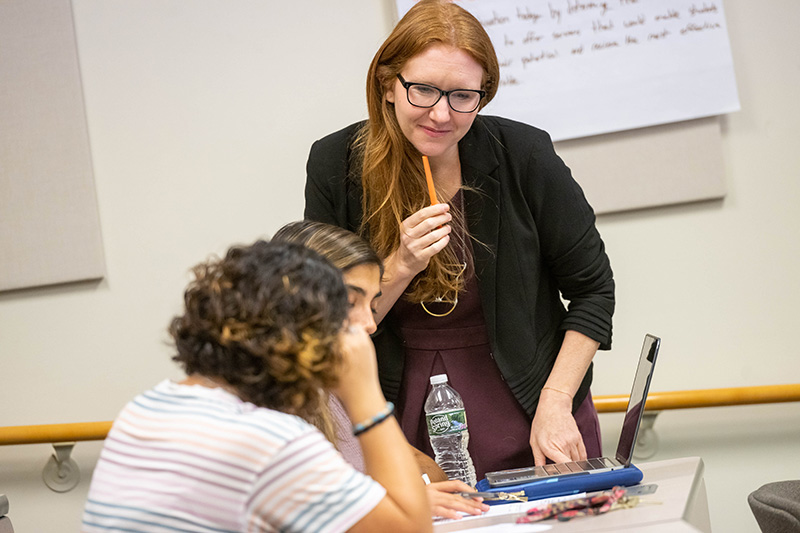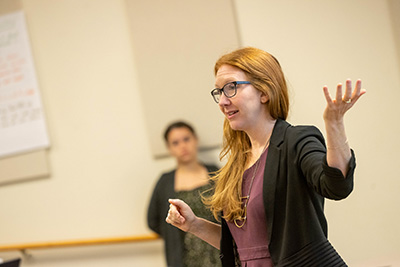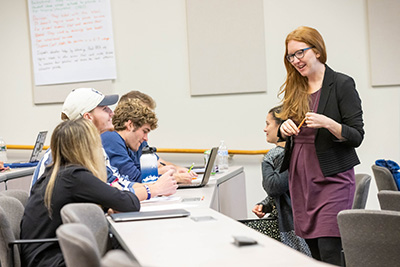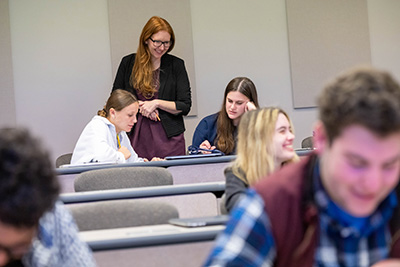
Laurie Kahn, associate professor of education, looks over student work in her classroom.
I loved growing up in Chicago. Spending my formative years in a diverse and dynamic midwestern city has shaped my perspectives as I moved all around the United States and abroad in my adult life. All four of my grandparents were Holocaust survivors and refugees to the United States during WWII. Education and kindness have always been viewed by my family as two of the most important things that could not be taken from you and so they were always highly valued. I was always taught to stay curious, keep listening, learning, and growing as a person and a citizen in this world.
What drew you to your academic discipline?
I was first drawn to field of education as an undergraduate when I majored in education studies and sociology. Education studies is the interdisciplinary examination of education, including research, policy, theory, pedagogy, and so forth, but it did not culminate in a teaching certificate. The questions of how our education systems and classrooms are shaped by social phenomena continues to fascinate me. I did my senior thesis as an undergraduate using oral histories of students who participated in a voluntary desegregation busing program in Connecticut in the 1970s and 1980s. I wanted to investigate what it meant to support individual students in a larger policy landscape that was designed to racially desegregate our schools after generations of explicit racist policies. I guess I have always been interested in how the macro (policies, culture, and systems) affect the individual’s lived experiences.
After graduation, I entered into an alternative route to certification. I was teaching special education in the Bronx during the day and taking masters courses in urban education in the evenings. I loved the community where I taught, and working for the New York Board of Education in District 75, a self-contained district for students with significant disability support needs, was such a wonderful and informative experience. But I still had a whole lot of questions.
So after several years in the classroom, I and my husband, who was also a teacher, traveled the world and volunteered at various schools for students with disabilities across several countries including Western Samoa, Laos, and Bolivia. This global perspective certainly shaped my understanding of how disability is socially constructed across various contexts and shaped the educational practices that we saw.

What are your research interests?
My field of research, disability studies in education, is an interdisciplinary focus on understanding disability, schools, and learning through many lenses, incorporating social, cultural, historical, legal, and political perspectives. We shift the thinking of “what is wrong with the individual and how can we fix them?” to “How does our education system privilege one kind of learner, and how can we change our educational systems to be more inclusive to all kinds of learners?” This shift is not just important in my research but also in how we educate our future teachers and how I support my own students, with and without disabilities.
I am very interested in learning about the ways in which disability is socially constructed across various contexts and how our school systems and classrooms are shaped by those constructs. Nothing we do in schools is culturally neutral; it is all shaped by how we’ve come to understand education, teaching, and childhood. One of my major areas of scholarship and research examines how to gain a more comprehensive understanding of how the disability dimension of our identity (disabled/neurodivergent, non-disabled/neurotypical) intersects with other dimensions of our identity (such as race, sexual orientation, gender, etc.). How does this intersection influence our lived experiences, and what we can do as teachers to create spaces of inclusion and belonging for students with and without disabilities?
Are there any specific moments from your experience with students that stand out in your mind as special?
Oh goodness! There have been so many experiences that stand out in my mind, especially when I think of how lucky I’ve been with the phenomenal teacher education students I’ve had the honor of working with across the years. Starting with when I came to Moravian University seven years ago, the list would be too long, as the relationships I have had with students have been the highlight of my career so far. I’ve had the privilege of being the faculty advisor for two SOAR students, and those were transformative experiences. Advising undergraduates as they develop their own identity as a scholar has been such a meaningful experience. Also, one of my favorite things to do is to bring students out of their comfort zone and give them the space to think critically about practices and viewpoints that they assumed were neutral to get a better understanding of education practices.

During my second year at Moravian, I had the pleasure of advising three undergraduate students in a volunteer research project that examined disability representation and children’s literature. Together, we traveled to Hawaii where they presented at an international conference. Watching our Greyhounds demonstrate their brilliance to practitioners and researchers from all over the world was such a highlight.
This past year I lead an Elevate program where I brought 15 students from Moravian to St. Thomas and St. John where we explored the schooling system and Caribbean culture and volunteered at several elementary schools. As much as I value and love the relationships and discussions that happen In my courses, nothing compares to these global experiences. I would have to say that most of the work I get to do with Moravian students stands out in my mind as special.
Share something about yourself that people may not know.
While I was applying for doctoral programs, I was working at a school in Florida where I took up hula hooping and became enamored with hoop dance. I hula hooped with fire, taught hula hoop classes, and even performed a couple of times. If I had not gotten into a doctoral program, my “plan B” was to be a teacher on the circus train with Barnum & Bailey (every train needs a teacher if there are children) while hula hooping with the acrobats during their circus performances. So my backup alternative was to runaway with the circus. That was almost 20 years ago, but I did recently buy some hula hoops and have been practicing a little bit again—although nothing is on fire.
What is your favorite space on campus?
The beauty of Moravians campus is one of the things that drew me to finding my home here, so there are so many places that come to mind. I love the magnolia trees that bloom in the spring in front of Comenius Hall. My favorite time on campus is when the weather is nice enough to hold class outside and have meaningful discussions sprawled on the quad or on the PPHAC patio.

What is your favorite Moravian University tradition?
There is nothing quite like graduation when it’s held out on the field. Seeing the students that I’ve known for years celebrating all of their accomplishments with their proud families is such a highlight. I’ve been known to get teary-eyed and love to gush to families about what thoughtful educators their children have grown into after years of learning. This is especially true for my special education major undergrads whom I have seen grow into talented and passionate professionals about to go out and change the world.
What do you like to do with your free time?
I have two incredible kiddos, ages six and eight, so most of my time outside of Moravian is spent with them, my loving husband (who is also an educational researcher), and our senior rescue dog, Huxley. This summer, we took a family trip to the Azores for a couple of weeks where we explored Portuguese fishing villages, ate our weight in seafood, went hiking through volcanos, kayaking, and got to see sperm whales. Traveling has always been a big part of our lives, and I love sharing this experience with my students and my children. After I finished my dissertation, I guided various trips including a month-long trip for US high schoolers through Cambodia. Otherwise, my free time is taken up with my family, hiking, reading, doing lots of arts and crafts (I am not afraid of some glitter), yoga, cooking, seeing live music, and being involved in community social justice activities.
I can never resist ________.
Sharing a good meal. I believe that relationships and conversations are best when you share food, and I mean literally share food. I enjoy all the rituals around nourishment, cooking, hosting, sharing, and even discussing food. There are very few foods that I do not like—raisins, sun-dried tomatoes, and black licorice—and I love trying new ones.
What is the best advice you have ever received or a quote that stays with you?
When I was in the final stages of my doctoral work at the University of Oregon, I was hosting an internationally known scholar, and he was asking about my research. I was telling him that I was still deliberating three different options for my dissertation. One was using big-scale international data, which would have really showcased my methodological skills. The second was the simplest route as I could use pre-collected data, which would cut quite a bit of time. The third was a significant passion project that I believed had a lot of social significance. The scholar looked at me with all sincerity and asked me, “Which one makes your heart beat faster when you think about it?” That question was all I needed to hear to make the decision to follow my instincts and do work that I believed was the most meaningful, interesting, and had the most impact.
Prestige and ease might have their advantages, but at the end of the day, we need to follow our passions. Following this advice has steered me right ever since. It also helps me continue to have faith in my values of kindness, generosity, equity, and joy, knowing that everyone is facing their own challenges. Staying true to this has allowed me to build community professionally and personally in ways that I hope I never take for granted.